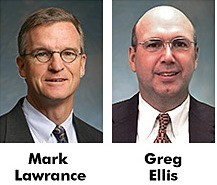 Indiana’s water quantity issue received significant attention in the 2016 Indiana legislative session as Sen. Charbonneau continues to champion calculated steps toward a credible water policy for the state. His mantra has been “data before decisions” and the legislation this year reflects that refrain, which the Indiana Chamber strongly supports.
Indiana’s water quantity issue received significant attention in the 2016 Indiana legislative session as Sen. Charbonneau continues to champion calculated steps toward a credible water policy for the state. His mantra has been “data before decisions” and the legislation this year reflects that refrain, which the Indiana Chamber strongly supports.
Senate Bill 347 (Water Resources) is Charbonneau’s 2016 flagship for the water issue. The bill does three things: 1) directs the Indiana Finance Authority (IFA) to conduct a “water loss” audit of all water utilities; 2) says the IFA will conduct a quality control assessment of well locations; and 3) instructs the IFA to study, analyze and report to the LSA by November 1, 2016, on the infrastructure needs of Indiana’s water utilities. This bill adds to the growing library of data that will guide the state’s water policy.
Senate Bill 257 (Distressed Water and Wastewater Utilities) promotes the purchase of distressed water utilities before they totally collapse. With over 500 water utilities in the state, this is a critical issue.
A cousin to SB 257 is SB 383 (System Integrity Adjustments).For many years, we have not adequately maintained our aging water and wastewater infrastructure. It is out of sight and out of mind. The cost is estimated at over $14 billion to restore this decaying system.
Senate Bill 383 provides that a water or wastewater utility may petition the Indiana Utility Regulatory Commission to recover approved charges. The Chamber supports a fair and equitable way to address this issue, for an inadequate water and sewer system will
negatively impact our economy.
House Bill 1300 (Environmental Management Matters) is IDEM’s annual catch-all bill with a variety of issues including: revising the term “land application”; revoking a temporary variance; clarifying when an antidegradation review is required; extending the vehicle mercury switch program; recycling issues and electronic devices reporting, and addressing rates and charges by regional water, sewage and solid waste districts. The Chamber supported HB 1300 as it clarifies and creates efficiencies within the administration.
House Bill 1299 (Voluntary Remediation Plan) was IDEM’s bill to give it more teeth to cull out those that are not adhering to its proposed work plan and timeline. The administration, however, pulled the bill as IDEM believes that it has enough power at this time to enforce the voluntary remediation plan (VRP) program. The Chamber believes that if a project is accepted into the VRP program that it should follow the approved plan within the identified timeline. The VRP program should not be a means to shield a site from litigation or cleanup.
Senate Bill 255 (Underground Storage Tanks) directs IDEM to conduct an actuarial study of the Excess Liability Trust Fund (ELF) that is to provide monies to clean up underground storage tanks.
The ELF realizes one penny for every gallon of pumped gasoline and diesel; the fund is now in excess of $100 million, with many millions in charges pending for cleanups. The actuarial study will identify how much money will be needed for registered tanks and the balance required to clean up “orphan” tanks that have no owners with a responsibility to remediate the site. The Chamber supported SB 255 as it promotes the restoration of sites, which potentially create a viable location for a business that will provide jobs and pay taxes.
The Chamber has long supported the use of waste products as a credible feedstock for another process. Senate Bill 256 (Legitimate Use of Solid Waste) conceptually promotes that model. If administered properly, it is a win/win as the producer of a waste saves the cost of treatment/disposal and the recipient of the material has a free or inexpensive feedstock – and valuable landfill space is not consumed.





 The many programs and benefits of Indiana Chamber membership include the state’s deepest and most effective group of issue experts. That team welcomes two talented additions.
The many programs and benefits of Indiana Chamber membership include the state’s deepest and most effective group of issue experts. That team welcomes two talented additions. Indiana’s water quantity issue received significant attention in the 2016 Indiana legislative session as Sen. Charbonneau continues to champion calculated steps toward a credible water policy for the state. His mantra has been “data before decisions” and the legislation this year reflects that refrain, which the Indiana Chamber strongly supports.
Indiana’s water quantity issue received significant attention in the 2016 Indiana legislative session as Sen. Charbonneau continues to champion calculated steps toward a credible water policy for the state. His mantra has been “data before decisions” and the legislation this year reflects that refrain, which the Indiana Chamber strongly supports.